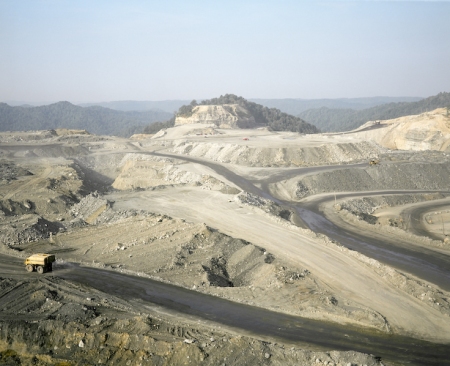Brian Ulrich has received a prestigious 2009 Guggenheim Fellowship. Ulrich is known on Photography for a Greener Planet for his series titled “Copia”, on the subject of mass consumerism in contemporary American Society. Congratulations to Ulrich and may his work continue to stop us in our tracks. See more here.

Archive for April, 2009
Brian Ulrich wins Guggenheim Fellowship
April 16, 2009Daniel Shea
April 9, 2009Coal. The most dangerous fossil fuel we burn for energy. And the most prevalent source of energy domestically here in the United States. It is a dirty, toxic, and destructive substance to both extract and turn into usable energy. One of the most destructive methods of extraction is called surface , prevalent in the Appalachian mountains, where the tops of mountains are literally sliced off in order to access the coal underneath. In addition to destroying the habitat of countless numbers of species that live and rely on it for food, water, and thus survival, the resulting waste from this type of extraction is then dumped into nearby bodies of water. Some rests in newly formed sludge ponds at the crater in the mountain’s peak, other waste quickly travels from nearby streams and rivers into bays, gulfs, and the ocean, contaminating everything in it’s path including drinking water, and adding to the growing dead zones currently surrounding coastal regions. The destroyed land can not be reclaimed, as the topsoil required for fertile pasture is poisoned and doesn’t return to its original state.
This violently destructive method of mining was the subject of a major body of work by photographer Daniel Shea. As revealed in his artist statement, “What started as an interest in the modern coal mining process known as mountaintop removal quickly evolved into an extensive study of the social/political institutions surrounding these practices. Above all else, I became interested in surveying the cultural implications of extracting coal from Appalachian Mountains. What I found over the course of the trip was that these coal mining operations had rapidly developed into one of the most destructive and pervasive forms of modern industry in the world.”

- When you’re standing in front of a young man 3 years younger than you that has started a life long career in underground coal mines, perspective comes easily. I spent an afternoon at a local Dairy Queen talking to people that were willing to donate a few minutes. Coincidentally I met 3 underground miners, all of whom were new to the job, and all 19 years of age. William Pettry, pictured here, talked to me at the end of his first day underground. He told me he thinks he’ll like the job, and that it pays pretty well.
The rest can be seen in Shea’s quiet, unobtrusive, and patiently taken photographs over a period of three months, resulting in the series aptly titled “Removing Mountains.” The images include landscapes showing surface mining’s physical distress on the land, as well as a glimpse into the neighboring towns, citizens and workers, and general Appalachian culture that both surrounds the practice and is inherently affected by it. To view more of Shea’s work please visit his website by clicking here.
Photographs needed — “Smart Cities” Environmental Project
April 1, 2009Photographs needed — “Smart Cities” Environmental Project The Smart Cities Initiative is a multimedia website tracking progress being made today toward smarter, more sustainable cities tomorrow. We are seeking specific images of the top-ranked U.S. cities (listed below) that demonstrate the progress they have made toward urban benchmarks such as clean air and water, green spaces, energy efficiency, and sustainable transportation. This is a non-profit project, and the website is being hosted by a very prominent national environmental group. Since we are unable to pay fees to license images, we are seeking photographers who are willing to donate the use of one or more of their images in support of efforts to create healthier, smarter, more sustainable places for Americans to live.
Images will be posted at only 72 dpi, and photo credits will be provided. This is an opportunity for you to have your photographs viewed by a wide range of policy makers, business leaders, developers, scientists, educators and entrepreneurs, while supporting an initiative to create positive change in our country. For more detailed information on the project and the specific images we are seeking from each city, please email jody@jgroupphoto.com.
These are the cities for which we still need photos: Arlington Heights, IL; Beaverton, OR; Bellingham, WA; Berkeley, CA; Boston, MA; Canton, OH; Charleston, SC; Chicago, IL; Columbus, OH; Dallas, TX; Denton, TX; Denver, CO; Everett, WA; Fayetteville, AR; Fort Collins, CO; Huntsville, AL; Irvine, CA; Laredo, TX; Los Angeles, CA; Madison, WI; Mission Viejo, CA; Mountain View, CA; Nashua, NH; New York, NY; Norwalk, CT; Portland, OR; Redmond, WA; Sacramento, CA; San Diego, CA; San Jose, CA; Santa Rosa, CA; Sarasota, FL; Scottsdale, AZ; Spokane, WA.




